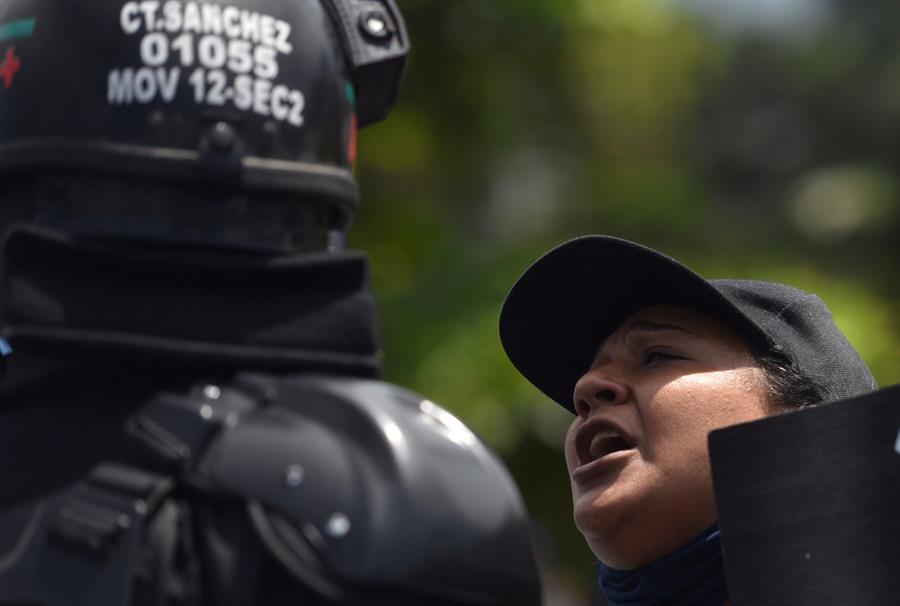RIO DE JANEIRO, BRAZIL – The Colombian government, which is going through its biggest crisis due to the protests that began last April 28 and which are the subject of accusations of police brutality, announced a comprehensive “deep transformation” of the Police.
The Police and the Mobile Anti-Riot Squadron (Esmad) are in the eye of the storm due to multiple accusations of excessive use of force, especially during the days of the national strike, which is entering its seventh week.

The announcement of these changes in the institution and in the Ministry of Defense, which will now be called Ministry of National Defense and Citizen Security, are known just before the visit of the Inter-American Commission on Human Rights (IACHR), to evaluate the respect for human rights during the protests in the country.
The mobilizations have left at least 20 dead, according to the Attorney General’s Office. Still, organizations such as the NGO Temblores allege that 45 homicides were committed by the security forces, 1,649 arbitrary detentions, 65 ocular aggressions, and 25 cases of sexual violence, among other human rights violations by the security forces.
OPPOSITION FEARS
“In essence, what it shows is that these are merely cosmetic changes. It is not enough to say that there will be more training in Human Rights in the Police, or that new offices will be created, units to present internal complaints within the Police (…) all that is cosmetic”, said opposition senator Iván Cepeda, of the Polo Democrático Alternativo (PDA) party.
In addition, Cepeda remarked that the real problems of the Police and the Army have to do with “corruption, violation of human rights”, which are issues of a “structural nature,” and that is why a transformation of this armed civilian corps is necessary.
The congresswoman of the opposition Colombia Humana María José Pizarro, considered that the announcement is an “achievement” of the National Strike, but that it should be “reviewed with attention, they cannot remain only as headlines or a strategy for the IACHR visit, we hope they are the door to an integral reform.”
PILLARS OF CHANGE
Colombian President Iván Duque announced today that the 10 pillars of the “integral transformation” of that body are in a decree presented to Congress on July 20, at the beginning of the next legislature.
The Colombian Police and the controversial Esmad (strike force) depend on the Ministry of Defense and have military training due to their participation in the armed conflict. One of the pillars of the proposed reforms is the “legal and legitimate use of force, with the incorporation of international practices and standards.”
Likewise, there will be new uniforms – blue rather than green – as well as new patrols, and acceleration in the installation and use of “body cams” to document the different police procedures.
Among the changes to restructure the Police announced by the head of state is the creation of a department within the National Police for the prevention, protection, and respect for human rights and the strengthening of institutional policy, as well as a new Disciplinary Statute, which includes the supervision and control of the police service and a new system for the reception, processing, and follow-up of complaints and denunciations.
THESE ARE FUNDAMENTAL CHANGES, SAYS THE GOVERNMENT
The Minister of Defense, Diego Molano, came out against those who claim the announced reform of the Police does not reach fundamentals.
“On the contrary, this is an integral and deep transformation of the Police because it has three components: professionalization with certification and competencies; new disciplinary regime to guarantee justice, procedures, clear international standards; and a change in the structure, adherence to human rights, not only of the Police but of the whole Ministry of Defense”, he pointed out.
However, Senator Cepeda insists that “the nature of the Police today is at odds with what is stated in the Constitution because the Police should be a civilian organization and has become, in practice, a military organization.”
It assumes -according to the senator- the public order and the response to citizen mobilizations as if they were “internal acts of war”. He also asserts that the Esmad operates with “character and patterns of conduct that are clearly in violation of human rights and that have led to countless complaints.”
He concludes that the Government’s announcements are so that “now with the coming of the IACHR it can be said that those recommendations that have been made countless times in relation to issues that the Government has not wanted and still does not want to put into practice.”

